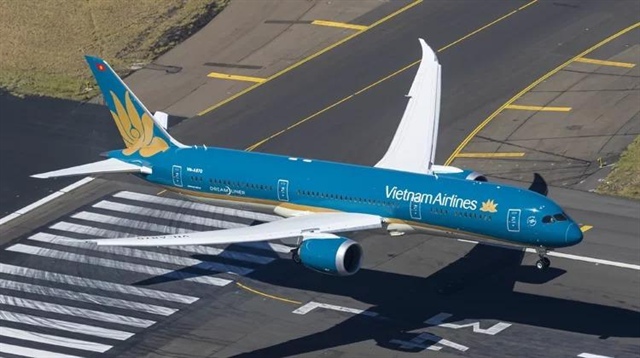Vietnam Airlines (HVN) plans share issuance to raise funds
Vietnam Airlines (HVN) plans share issuance to raise funds
The national flag carrier remains optimistic about the recovery of the market from late 2022 and in 2023.
Vietnam Airlines is taking steps to issue shares, scheduled for 2023-2024, in a bid to raise funds and improve the carrier's financial situation.

The airline is still struggling with Covid-19 impacts. File photo |
As a State-owned entity, the airline would need approval from the Government for the issuance plan.
The move was revealed in the national flag carrier’s document submitted to the Ho Chi Minh Stock Exchange on measures to halt its continual losses after its stock (HVN) was placed under supervision.
In 2021, Vietnam Airlines issued shares worth VND7.9 trillion (US$337.6 million) to existing shareholders and raised its registered capital to over VND22.1 trillion ($945 million).
Another plan is to issue shares to the public, and therefore the Government’s stake-holding in the airline.
Amid severe impacts from the Covid-19 pandemic, Vietnam Airlines suffered consolidated losses in the 2020-2021 period and the first quarter of 2022.
The airline’s financial statement in the second quarter revealed its financial capacity is improving with the net loss declining by 44% year-on-year to VND2.24 trillion ($95.7 million).
As of June 30, 2022, Vietnam Airlines suffered a negative of VND4.9 trillion ($210 million) in own capital equity, significantly higher compared to a negative of VND2.8 trillion ($120 million).
Commenting on the situation, Vietnam Airlines noted several challenges that have hindered its efforts for recovery, including the slow recovery of the global aviation market as a result of the Russia-Ukraine conflict, rising fuel prices, and high inflationary pressure.
But it remains optimistic about the recovery of the market from late 2022 and in 2023.
Under the airline’s restructuring plan for 2021-2025, it aims to optimize its business model in 2022 and reduce the losses for eventual profitability in subsequent years.
In addition, Vietnam Airlines would continue to restructure its assets and investment portfolios to raise revenue, including the sale or lease of aircraft, and divest investment capital from different projects until 2024.
At present, the Government remains Vietnam Airlines’ largest shareholder, holding 86.34% stake via the Commission for State Capital Management (CSCM) of 55.2% and the Government investment arm State Capital Investment Corporation (SCIC) (31.14%), followed by the Japanese aviation company ANA Holdings (5.62%).
Hai Yen






















